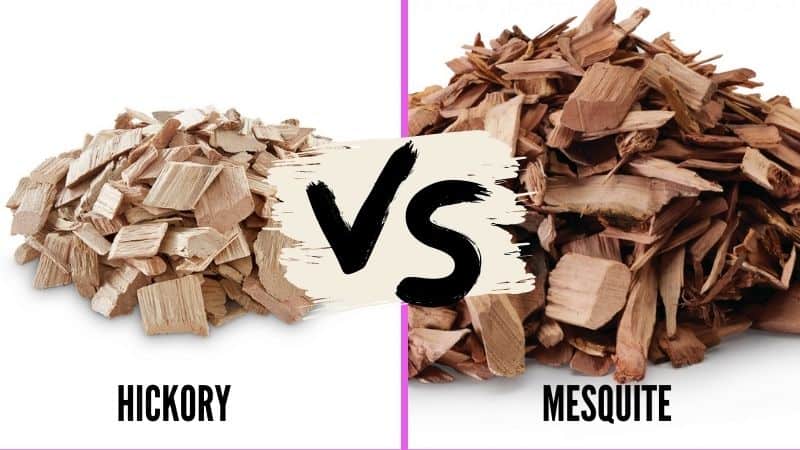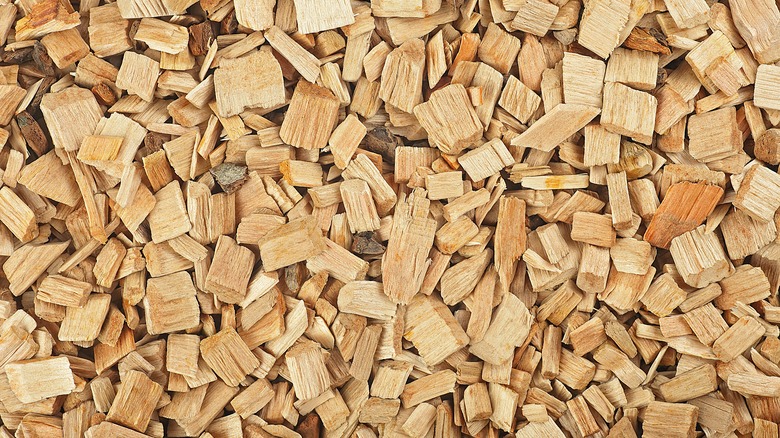Because turkey is smoked, you need to know which woods to use and which ones to avoid. This is true for all smoked meats, even meatloaf. The common thread here is mellow vs. strong flavors. Most of the time, turkey-friendly woods are lighter than turkey-unfriendly woods, which tend to take away from the natural flavor of the bird.
Turkey gets a bad rap from a culinary perspective. A lot of people don’t like it—it’s dry, too hard to work with, makes you sleepy, etc.—but we eat it on Thanksgiving. But while its certainly a trickier cook than something like chicken, turkey can be incredibly rewarding. You should just take your time with it, and smoking it is one of the best ways to do that. That slow cook preserves the birds juiciness while imbuing it with a great pop of smoke flavor.
Is Mesquite or Hickory Better for Smoking Turkey? A Definitive Guide
As Thanksgiving approaches, many home cooks start pondering the perfect wood for smoking a turkey. The choice often comes down to two popular options – mesquite or hickory. While both can deliver incredible flavors, they have distinct characteristics that impact the end result. This comprehensive guide examines the pros, cons and ideal uses of mesquite and hickory for smoking turkey.
Mesquite – A Bold, Intense SmokeRenowned for its robust flavor profile, mesquite imparts an incredibly intense smoky taste. It works wonders with beef and other red meats. However, poultry requires a delicate touch Mesquite can easily overwhelm a turkey, so exercise caution when using it
Pros:
- Strong, penetrating smoke flavor
- Unique taste that sets it apart from milder woods
- Brings a savory complexity and visually appealing brown exterior
Cons:
- Can impart bitterness if overused
- Easily overpowers the delicate flavor of turkey
- Needs to be used sparingly and balanced with other woods
Best Uses:
- Blending with milder fruitwoods like apple or cherry
- Smoking legs, thighs or wings rather than the delicate breast meat
- Smaller birds under 12 pounds, where the assertive smoke has less meat to permeate
I prefer oak, pecan or applewood for large turkeys to allow the bird’s natural flavors to shine. However, a touch of mesquite can be welcome in the mix, adding spice but not taking over.
Hickory – A Quintessential Smoking Wood
Hickory has secured its place as one of the top woods for smoking meat due to its signature robust, smoky sweetness. It pairs wonderfully with pork but requires caution with poultry. Too much hickory can make turkey bitter. Used judiciously, it adds a lovely smokiness.
Pros:
- Rich, robust smoky flavor
- Infuses a deep woodsmoke taste that complements turkey
- Readily available in most regions
Cons:
- Can impart bitterness if overused
- Has a potent flavor that can overwhelm more delicate turkey meat
- Need to use it very sparingly, especially on white breast meat
Best Uses:
- Smoking turkey legs and wings which can handle more assertive flavors
- Blending with lighter fruitwoods to balance the smokiness
- Smaller birds under 12 pounds, rather than giant turkeys
While hickory makes fantastic smoked turkey, restraint is required. For whole birds, I suggest combining it with applewood or maple. For just the legs, a tad more hickory can shine.
Fruitwoods – A Milder, Sweeter Option
For those who find mesquite and hickory too intense, fruitwoods like apple, cherry and peach provide a sweet, delicate alternative. They lack the assertive punch but produce enough subtle smokiness to deliciously complement turkey.
Benefits:
- Impart a milder, sweeter smoke flavor
- Allow the flavor of the turkey itself to take center stage
- Ideal for smokers new to poultry who want to gently enhance the bird’s flavor
Drawbacks:
- Don’t penetrate the meat as deeply as hickory or mesquite
- Provide a more subtle, nuanced smoke rather than an intense blast
I suggest applewood, cherry, peach or pear for whole smoked turkeys. The mild fruitwood smoke gently permeates the meat without masking the delicious flavor of the bird. Then go bolder with mesquite or hickory just on the legs.
Tips for Preparing Turkey with Hickory and Mesquite
If using assertive woods like hickory and mesquite, keep these preparation tips in mind:
- Brine the turkey beforehand to keep it juicy and well-seasoned
- Apply a dry rub for added flavor
- Mix in some apple, pecan or maple wood for balance
- Smoke the turkey at 225 to 250 degrees F to ensure even cooking
- Use a water pan or fruit juice to impart moisture and sweetness
- Rotate the turkey and move it around to prevent overly dark spots
- Apply glazes and sauces at the end rather than earlier
The Perfect Blend – A Little of Both
One great option is to combine woods for a more nuanced flavor profile. Try using hickory or mesquite along with applewood or pecan. The intense smoke from the hickory pairs well with the sweetness of the applewood. Using two or more varieties creates depth and complexity.
I also recommend using assertive woods mainly on the legs and wings. The delicate breast meat often benefits from mellower fruitwoods. Let the various parts of the turkey shine by tailoring the wood to each one.
In Conclusion
Mesquite and hickory both make stellar smoking woods. However, with turkey, a delicate touch is required. Hickory delivers a quintessential smoky flavor but can overwhelm. Mesquite gives an incredible intensity that can be overpowering. Both benefit from being combined with milder fruitwoods.
Hopefully this guide provides insight into successfully navigating the hickory vs. mesquite debate. Always start with smaller amounts of strong woods and increase gradually. With the right balance, you can craft an amazing smoked turkey this Thanksgiving.

The right kinds of wood have mellower, lighter flavors

The key here is mildness. You want woods that impart delicate flavors that let the turkey itself shine. Happily, youve got several options here. Cherry wood adds a slightly sweet flavor that goes well with turkey, like how cranberry sauce is a great Thanksgiving side dish. Pecan does the same thing, except it also has a nutty quality to it.
Maple is sweet like pecan and cherry, but not as sweet. This makes it a great choice if you don’t like pecan or cherry. Apple wood can work well, too. But in this case, you have to be careful. It takes longer for apple’s mild flavor to come through, and turkey is especially likely to dry out.
There are some types of wood that you should never use to smoke turkey, though. A lot of people smoke beef with hickory and mesquite, but the heavy flavors they give turkey tend to overpower it. Even though oak is lighter than the other two, it can still be a problem. However, you can mix it with something like cherry.
Oak, Mesquite, Pecan or Hickory? Picking the Right Barbecue Wood | BBQ with Franklin | Full Episode
FAQ
What is the best wood to smoke turkey with?
Is mesquite good for smoking turkey?
Is mesquite turkey good?
Is Hickory better than Mesquite?
Mesquite has a much stronger flavor and is best reserved for cuts of beef, particularly brisket. If you’d like to experiment with mesquite without overpowering the meat, try combining it with a milder wood. Hickory is considered a medium-strength wood, one that imparts a generous smoky taste.
Is mesquite good for Turkey?
Mesquite is one of the strongest flavors of wood out there. It’s extremely robust in flavor, and when being used with meat like brisket, it needs to be. But with turkey it’s just too deep a flavor, and will overwhelm the flavors of your turkey.
Is Hickory a good substitute for mesquite wood?
Some pitmasters have even experimented with hickory for smoking fish and cheeses, but we think it overwhelms the subtle qualities of these ingredients. Mesquite is used almost exclusively for hearty cuts of beef, especially in Texas, where the flavor is renowned. In particular, brisket is one of the most popular partners for mesquite wood.
Can you use hickory wood for brisket?
Hickory is a medium-intensity wood that pairs well with pork, although we would also recommend using it when grilling chicken or beef. Mesquite has a much stronger flavor and is best reserved for cuts of beef, particularly brisket. If you’d like to experiment with mesquite without overpowering the meat, try combining it with a milder wood.
What does mesquite wood taste like?
Mesquite is a wood that produces a strong flavor. The flavor profile is bitter, sharp and strong with an earthy string flavor. Mesquite wood flavoring is easily identifiable. The flavor is trying but enjoyable, yet we recommend not use too much of this wood at first until you find your own taste.
Which Wood is best for smoking Hickory?
Oak is another classic smoking wood with a deep flavor, although in comparison to mesquite and hickory it’s a bit lighter. It’s not often associated with poultry, and it’s not difficult to see why. However, because it’s relatively softer than hickory and mesquite, it can be used when combined with cherry to create a more nuanced flavor.
